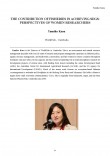The contribution of fisheries in achieving SDGs: Perspectives of women researchers

WorldFish is an international research organization with a mission to reduce poverty and hunger by improving fisheries and aquaculture. Our work focuses on sustainable small-scale fisheries and aquaculture in developing countries where impoversished persons rely on fish for purposes of livelihood and food security. When the Sustainable Development Goals (SDGs) came into effect in 2016, it was clear that WorldFish’s work contributed most directly to Goal 14 - Conserve and sustainably use the oceans, seas and marine resources. However, a review of the specific targets of each SDG revealed a more complete picture. WorldFish puts people in the center of sustainble resource use and planning. That means that fish has an important role to play in nearly all of the SDGs, especially in terms of ending poverty (1), as well as achieving zero hunger (2), good health and well-being (3) and gender equality (4). Approaches to fisheries have been shifting from a focus on production technologies and yields, to scaling up and out to include questions around what is the role of fish in the context of household income portfolio, subsistence, nutrient supply, and governance (Curtin and Prellezo, 2010). When we put humans at the center, we also start to include questions of fair valuation of labor and benefit-sharing so that both women and men in different segments of society can enjoy equitable share of the benefits of this common pool resource, and a seat at the decision making table (FAO 2015). At WorldFish, we pursue gender as a cross-cutting theme, meaning we think it is important to apply a gender lense in all aspects of our work. WorldFish’s researchers, both women and men, assess power dynamics and social norms that exist at community and household levels and create barriers for women to apply their knowledge and skills to solving the issues at hand. Then, by removing those barriers, we can begin to link our fisheries and aquaculture interventions with positive livelihood and nutritional outcomes at household and community levels (Cole, 2014). For the field of fisheries science to go the extra mile and become relevant to SDGs, researchers need to think out of the box and out of the comfort zones of their own individual expertise and space where they operate. Both male and female fisheries researchers need to build the skills and knowledge to apply gender transformative approaches to his or her work to ensure that research outcomes reach beyond fish production increases. Some examples of WorldFish’s work illustrate practical applications of this thinking, including nutrition-sensitive fisheries and aquaculture, post-harvest value chains, and the role of fish in dietary diversity.
| 別タイトル | 水産資源のSDGs達成への貢献~女性研究者の視点から |
|---|---|
| 刊行年月日 | |
| 作成者 | Yumiko Kura |
| 著者キーワード | Benefit-sharing Gender SDGs Livelihoods Nutrition |
| 公開者 | Japan International Research Center for Agricultural Sciences |
| オンライン掲載日 | |
| 国立情報学研究所メタデータ主題語彙集(資源タイプ) | Conference Paper |
| 号 | 2018 |
| 開始ページ | 25 |
| 終了ページ | 30 |
| 言語 | eng |
